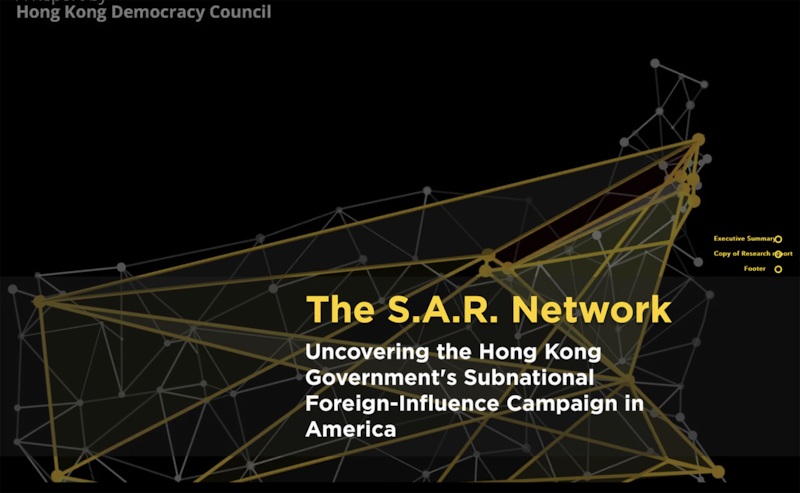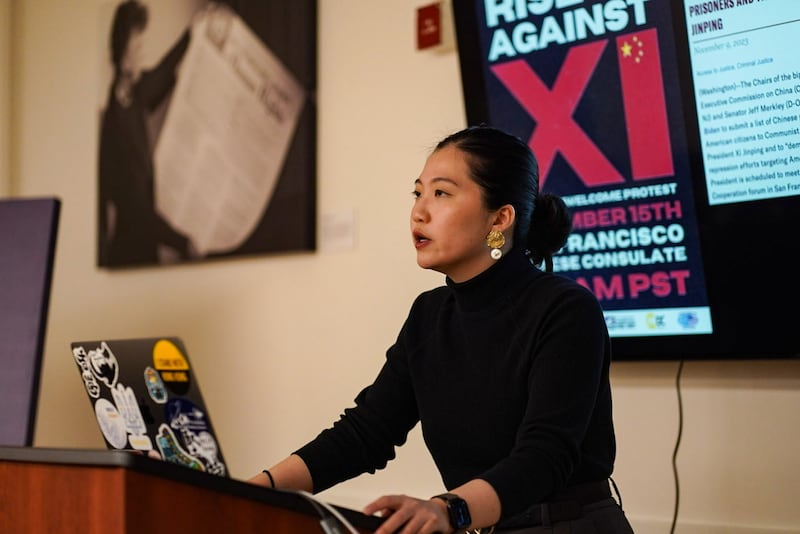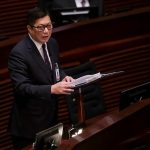Chen Zifei for RFA Mandarin
Read this story in Chinese
Hong Kong’s government is pushing ahead with a coordinated political influence campaign across the United States, a report by a Washington-based Hong Kong Democracy Council advocacy group said.
According to the report, the city’s government “has cultivated ties in the U.S. at state and local levels through government organizations and astroturf groups.”
It said the campaign included local and regional politicians, media organizations, think tanks and business communities, and that the effort often flew under the radar of safeguards aimed at curbing foreign influence in U.S. political life.
The Hong Kong Special Administrative Region government coordinated efforts through its Economic and Trade Offices in New York, San Francisco and Washington, to strategically target media, think tanks, and business communities “at the subnational level,” the report said.
The report comes as Bill Yuen, a former official at the Hong Kong Economic and Trade Office in London, stands trial in the United Kingdom charged with “assisting a foreign intelligence service,” and “foreign interference,” under the National Security Act 2023.
U.S.-based democracy activists called in May 2024 for Hong Kong’s offices to be shut down, saying they serve as intelligence outposts controlled by the Chinese government.

The Hong Kong Chamber of Commerce has also been involved in helping Beijing publicize its “Belt and Road” infrastructure and influence program in Southern California, according to report author Mason Wong.
Wong said the propaganda push appears to be working.
“After the Hong Kong Trade Development Council cooperated with a think tank that has a great influence on California’s economic and trade policies, the think tank’s report wrote that the Hong Kong National Security Law had had no impact on Hong Kong’s business environment and is supported by Hong Kong people,\” he said.
The law prompted a mass exodus of people from Hong Kong, with many citing fears that their children would be subjected to Chinese Communist Party “brainwashing” in the city’s schools.
“We can see that their work is mainly to safeguard China’s interests and work on China’s behalf,” he said, adding that the program relies on the fact that local politicians and businesses may be unaware of China’s overseas influence operations, and therefore be easier to infiltrate than those at national level.
Since taking power in 2012, Chinese President Xi Jinping has launched an accelerated expansion of political influence activities worldwide, much of which rely on overseas community and business groups under the aegis of the United Front Work Department.
China has also set up an overseas network of “police service centers” that are sometimes used as a base from which to monitor and harass dissidents in other countries, prompting some governments to shut them down.
Anna Kwok, the Hong Kong Democracy Council’s executive director, said greater vigilance was needed to combat China’s overseas influence operations on American soil.
“In the U.S. Congress, there is a bipartisan consensus that we need to be wary of organizations related to China and the Hong Kong government,” Kwok told journalists on Oct. 29. “But politicians at state and city level don’t always understand China-related or Hong Kong-related issues.”

“The Chinese government and the Hong Kong government take advantage of this gray area, and organize a lot of cultural activities to reduce the vigilance of local politicians and spread their preferred narratives at the local level,” she said.
Kwok said Beijing’s “United Front” outreach and influence strategy is now being used by the Hong Kong authorities, citing the use of overseas Chinese community organizations as a front for government-backed influence operations.
“The Hong Kong government has been using these civil groups as a cover for their infiltration of the United States, in the hope that some Americans will believe that they represent public opinion in Hong Kong,” she said.
Kwok said the operations have intensified in the years since the authorities began a crackdown on public dissent and political opposition in the wake of the 2019 protests.
Atlanta-based political consultant Gene Hanratty, whom the report said was hired by the Hong Kong Economic and Trade Office in New York, confirmed he had worked for the Office to focus on “trade and cultural exchange.”
The report said Hanratty had used the Atlanta Hong Kong Dragon Boat Festival to spread Beijing’s narrative about the 2019 pro-democracy movement.
Hanratty said he is no longer working for the Office but retains his seat on the board of directors of the National Association of Chinese Americans, and declined to answer questions from RFA Cantonese about the source of its funding, saying it wasn’t within his remit.
Asked about the Dragon Boat Festival, Hanratty said it was a cultural event that was totally non-political.
Translated by Luisetta Mudie. Edited by Luisetta Mudie and Eugene Whong.

